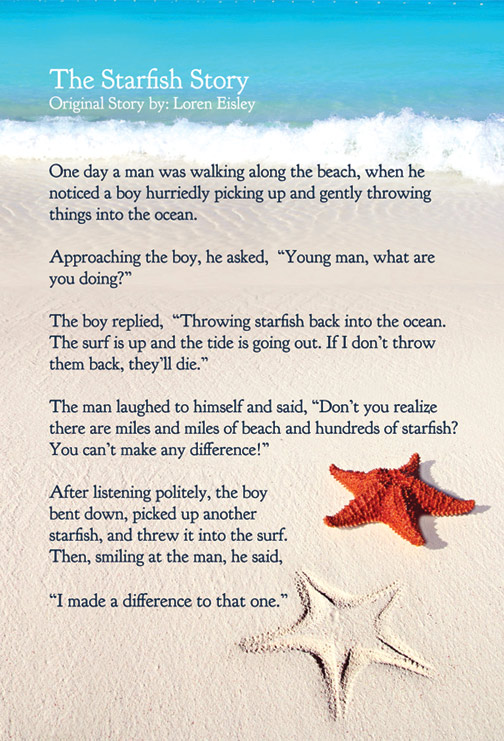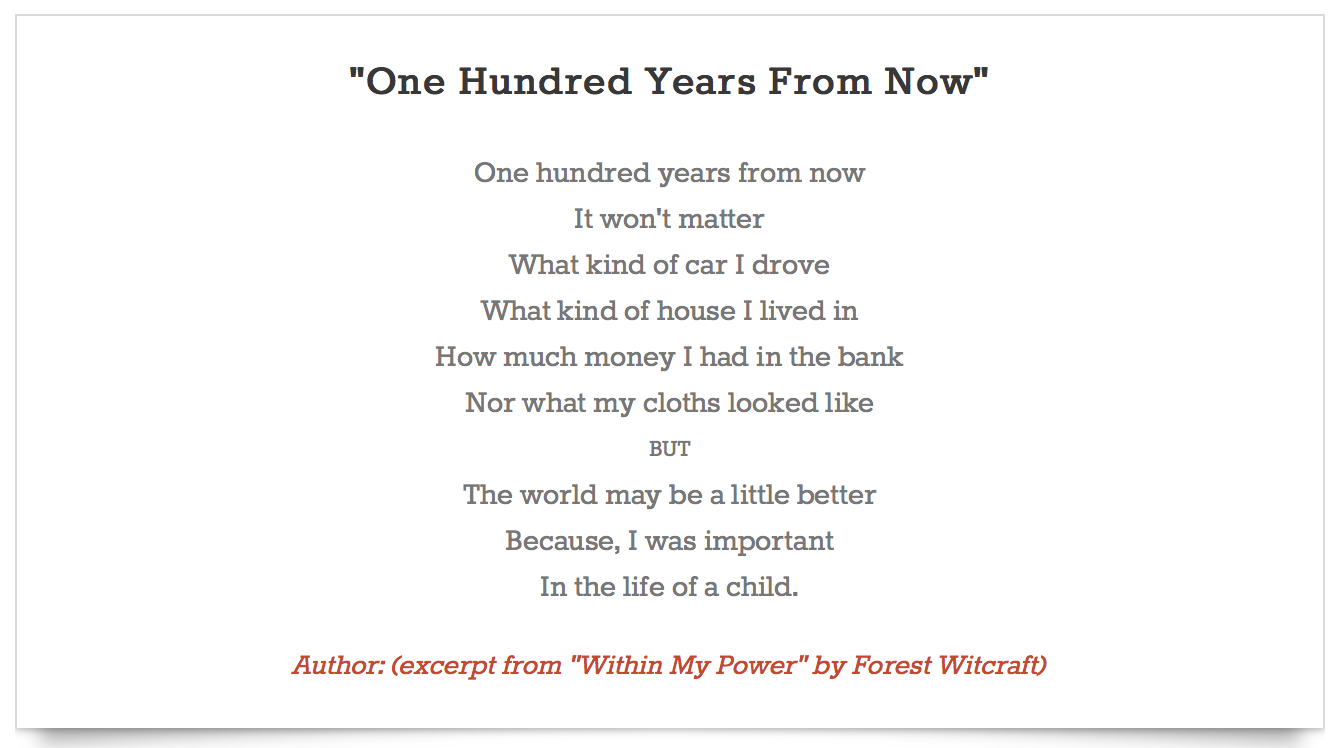 Today’s families, schools, and communities often feel pulled in many different directions for many different purposes. Societal norms, curricular expectations, self-imposed and peer pressures, even media portrayals of what is right and wrong leave many of us wondering, What matters most? If we look both inward and outward, backward and forward, we know that that the answer to this question can often be summarized in a single statement: What matters most is that I was important in the life of another…
Today’s families, schools, and communities often feel pulled in many different directions for many different purposes. Societal norms, curricular expectations, self-imposed and peer pressures, even media portrayals of what is right and wrong leave many of us wondering, What matters most? If we look both inward and outward, backward and forward, we know that that the answer to this question can often be summarized in a single statement: What matters most is that I was important in the life of another…
A Note to School
I came across this poem in my travels and it made me think about the difference we make each day in the life of my child. I just wanted to say, “Thank You.”
A parent who makes a difference
Ultimately, feeling important in the life of another or making a difference in the world is what we want for ourselves, our children, our families, our schools, and our communities. But, what does this mean within the context of family-school engagement? And what does being important and making a difference in family-school look and sound like?
 What matters most (according to Leo Tolstoy as retold by Jon Muth in The Three Questions) is to ask ourselves these three questions: What is the most important thing to do? When is the right time to do things? Who is the most important one?
What matters most (according to Leo Tolstoy as retold by Jon Muth in The Three Questions) is to ask ourselves these three questions: What is the most important thing to do? When is the right time to do things? Who is the most important one?
- What is the most important thing to do in terms of family-school engagement? How do we know what to do first?
- When is the most important time? What are the most important opportunities? What is not to be missed?
- Who are the most important people, the ones that I should listen to before all else, within the context of family-school engagement?
These questions underpin the work that we do with families, schools, and communities. Not only are they theoretical and philosophical, but they are also practical and professional questions that can guide us in productive relationships with each other. They are also wonderful life lessons for children.
 At a theoretical and philosophical level, we can emphatically say that what matters most for family-school engagement is that we consider alternative perspectives, find our strengths, and work within our comfort areas. The most important time is always and forever, and the best place is a judgement-free context that allows us to be who we are, a context that does not view family-school engagement as a one-size-fits all approach. With the child at the core of all we do, we cannot go wrong; so, the most important ones are the ones in relationship, the ones who work toward the best interests of the child. This is not always easy, but what we do know is that families, schools, and communities (like children) need to develop a sense of well-being, resilience, and well-doing. We need to struggle with success (See Too Much, Too Little) and celebrate the small successes of each day, realizing that even just one more family-school relationship brings us closer to our goals. Sometimes this means that we wait and set aside our desire to see an immediate difference (see How do we measure up?)… we may not always see the roots growing, but with a little patience and care, sooner or later, we just might see the sprout peek through the ground.
At a theoretical and philosophical level, we can emphatically say that what matters most for family-school engagement is that we consider alternative perspectives, find our strengths, and work within our comfort areas. The most important time is always and forever, and the best place is a judgement-free context that allows us to be who we are, a context that does not view family-school engagement as a one-size-fits all approach. With the child at the core of all we do, we cannot go wrong; so, the most important ones are the ones in relationship, the ones who work toward the best interests of the child. This is not always easy, but what we do know is that families, schools, and communities (like children) need to develop a sense of well-being, resilience, and well-doing. We need to struggle with success (See Too Much, Too Little) and celebrate the small successes of each day, realizing that even just one more family-school relationship brings us closer to our goals. Sometimes this means that we wait and set aside our desire to see an immediate difference (see How do we measure up?)… we may not always see the roots growing, but with a little patience and care, sooner or later, we just might see the sprout peek through the ground.
At a practical and professional level, we can call forward some of the lessons we learn both on and off the school landscape.

What is the most important thing to do in terms of family-school engagement? How do we know what to do first? We know that at the core of all we do is trust, compassion, and setting aside assumptions (See One Marble in the Jar). As teachers, we need to keep it real, and we need to know how to offer our own stories of experience in order to connect, relate, and empathize (See Special Forks). Keep in mind that often simple is better, and that whatever we do, we need to keep it manageable and sustainable (See With Simplicity in Mind, A Warm and Safe Welcome, Feel the Difference).
When is the most important time? What are the most important opportunities? What is not to be missed? The most important time is when it is needed; the most important opportunities are often those that are unimagined: the walks in the park, the discussion in the grocery store parking lot, the conversations along the boards at a hockey game, the communication to and from school (See Communicating with Confidence, How Do I Share Information, Communication for Good and For Bad. Engaging schools and families in real life situations keep us grounded in the notion that, We are all the same, except in the details.
Who are the most important people, the ones that I should listen to before all else, within the context of family-school engagement? This is perhaps the toughest one of all… do we listen first to the mandate, to students, to families, to ourselves, to research? To me, this goes hand in hand with the most important time… the ones we listen to before all else are the ones in front of us, the ones who need to share and to make connections. We listen to our inner selves as this gives us an idea of the right thing to say and how to communicate with confidence. We listen to the research that tells us to set aside our deficit-based assumptions (See Engaged or Not?, Is it Really Just Semantics). And we brave the courageous conversations that allow us to work effectively as family-school communities, keeping at the forefront that all families want what is best for their children as do schools (See ABCs, Welcome to Kindergarten, Family-School Ways to Well-being).
At the end of the day, the most important thing to do is in the moment, to be mindful of how the decisions we make each day impact family-school relationships and inspire collective confidence (See Inspiring Collective Confidence). The most important time is right now… we cannot put off until tomorrow what needs doing today. And the most important ones are the ones we are with, the ones we have right in front of us.
With thought, time, and effort, we can make a difference… one at a time. And that is what matters most.
What are your theoretical, philosophical, practical, and professional beliefs and practices? Who are you within the context of family-school engagement?


